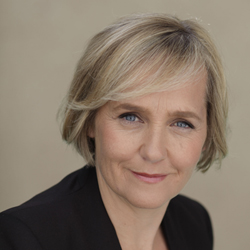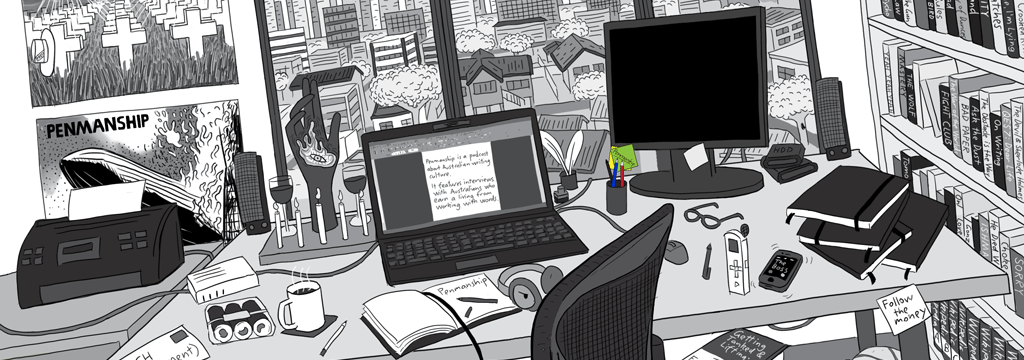Sarah Ferguson is a journalist and author.
 Last year, ABC television screened her three-part documentary series The Killing Season, which examined the forces that shaped the Australian Labor Party during the recent years in which Kevin Rudd and Julia Gillard led the party, and the nation. Based on Sarah’s lengthy and insightful interviews with key political players, and filmed with the drama and style of the Netflix series House Of Cards, it was pitch-perfect television that resonated strongly across the country, attracting around a million viewers each episode. The series further established Sarah’s reputation as one of Australia’s finest television interviewers and presenters. Since 2008, she has worked as an award-winning investigative journalist on current affairs program Four Corners – which she currently hosts – as well as filling in for Leigh Sales as the host of 7.30 in 2014, and conducting several hard-hitting political interviews during that time.
Last year, ABC television screened her three-part documentary series The Killing Season, which examined the forces that shaped the Australian Labor Party during the recent years in which Kevin Rudd and Julia Gillard led the party, and the nation. Based on Sarah’s lengthy and insightful interviews with key political players, and filmed with the drama and style of the Netflix series House Of Cards, it was pitch-perfect television that resonated strongly across the country, attracting around a million viewers each episode. The series further established Sarah’s reputation as one of Australia’s finest television interviewers and presenters. Since 2008, she has worked as an award-winning investigative journalist on current affairs program Four Corners – which she currently hosts – as well as filling in for Leigh Sales as the host of 7.30 in 2014, and conducting several hard-hitting political interviews during that time.
In 2016, Sarah became an author with The Killing Season Uncut. Co-written with series researcher Patricia Drum and published in April by Melbourne University Publishing, Sarah’s book goes behind the scenes to candidly reveal the stories behind the interviews with Rudd, Gillard and a host of other key players. I found that her asides into the craft of journalism were a highlight of the book, such as this quote: “The business of persuasion is a fraught one for journalists. Persuasiveness is one thing, bullshit is another. You have to understand your subject intimately and what their purpose is in speaking on camera. I prefer candour but it’s not enough by itself. And you are not friends, although it can appear that way. The line you shouldn’t cross is usually only visible when it’s behind you.”
When Sarah was on a day trip to Brisbane in early May, we met at her inner-city hotel room so that I could ask her a few questions before she had to dash off to a radio interview across town. It was a thrill to be sitting across from one of the country’s most formidable journalistic brains; within a few minutes, she had called me out for incorrectly attributing a quote from the book to her, rather than Julia Gillard. Our conversation touches on how her writing style has developed across her career; her early writing influences, including her love of poetry; how she comes up with ideas for her Four Corners stories; why she posted a Julia Gillard quote above her desk; who she turns to when she’s having trouble with a story; and how she decided to open a live budget night interview on 7.30 with a particularly devastating question for then treasurer Joe Hockey.
Sarah Ferguson is an author and ABC journalist. In the same year that she worked on The Killing Season, she also wrote and presented Hitting Home, the landmark series on domestic violence. She has presented the ABC’s 7.30 and worked as a journalist on Four Corners, where she won four Walkleys – including the Gold Walkley in 2011 for ‘A Bloody Business‘ – the Melbourne Press Club Gold Quill Award, four Logies for most outstanding public affairs report, as well as the George Munster Award for Independent Journalism and the Queensland Premier’s Literary Award.
Sarah Ferguson on Twitter: @FergusonNews
Direct download | iTunes | Stitcher | Libsyn | YouTube
Timeline:
3.00 Earlier that morning, before our meeting, Sarah was interviewed by Richard Fidler for his Conversations program on ABC Radio
4.00 The book came about after Louise Adler, head of Melbourne University Publishing – “a ferociously smart, energetic woman who sees projects from a long way off” – approached Sarah to write a book version of the documentary series, after Hitting Home went to air
6.00 Melbourne University Publishing was the publisher, rather than ABC Books, because Louise Adler “pushed hard, pushed early, pushed longest”
6.30 Sarah’s co-author, Patricia Drum, worked on The Killing Season as a researcher, so it was an easy decision for the pair of them to work together on the book; to begin, Drum went back through the extensive transcripts from the interviews, and the pair of them worked together on what to keep in the narrative
7.30 For the television series, they filmed 54 interviews and used 51 of those in the final cut, and there were also about 110 hours of pre-interviews on-camera
8.00 Sarah says she loved writing the book: “I was unprepared for how much I enjoyed it”
9.00 The structure of the book was readily apparent, as it followed the narrative arc of the series
10.00 Sarah was recently profiled in Good Weekend by feature writer Stephanie Wood (‘The Inquisitor‘), a process she found “awful”: “I like doing media about the work I do; I dislike it intensely when it’s about me. [Stephanie] had a tough job, and she did very well in the circumstances”
11.00 Sarah had posted one of Julia Gillard’s ripostes to Malcolm Turnbull above her desk for some time; the short quote was Latin for “only endure”, a line which resonated with her
13.00 Sarah says that writing is “essential” to the process of storytelling for television: “Capturing the story, capturing the narrative, and using words to bring out the beauty of the human dynamics that you’re looking at, and the visual scene in front of you, is a real skill”
14.00 “If I was to show you a page of a good script, it would have not many words on it; if I was to show you the page of a poorly written script, it would have lots and lots of words; less is more in television writing”
15.00 One of Sarah’s early writing influences as a journalist was American novelist and poet Gertrude Stein: “My writing was a bit polluted early on, and it was probably a bit pretentious. I think all of that’s gone”
15.30 How Sarah knows when a story is complete, and when she’s got the words and pictures right
16.00 Sarah’s sparse writing style today is influenced by her love of poetry, too, and the rhythm of words on the page
17.00 In the first episode of The Killing Season, Sarah is particularly proud of a turning point in the narrative, where a series of shots of Parliament House is accompanied by a voiceover line: “Winter crept over the capital”
19.00 For six months in 2014, Sarah was the host of 7.30; one of her key political interviews during this time was with Treasurer Joe Hockey on budget night, where she opened with a particularly devastating question, which she showed to The Guardian journalist Katharine Murphy while inside the budget lock-up
21.00 “Every now and again in a studio, it’s good to mark out your territory, and just say, ‘You’re in my zone, you’re here to answer questions on behalf of an audience, you’re not here just to deliver a speech’. The point of that question was to take us right to the heart of what that budget was about”
21.30 How Sarah comes up with ideas for her Four Corners stories
23.00 What an ideal day looks like for Sarah while working on a Four Corners story
23.30 Sarah’s reading diet is “really messy, and goes up and down in fits and starts, healthy and unhealthy”; she has several books and authors to which she returns frequently, including the Aubrey-Maturin series by Patrick O’Brian, The Good Soldier by Ford Madox Ford, Jane Austen, Playing To The Gallery: Parliamentary Sketches from Blair Year Zero by Simon Hoggart, Frank Moorhouse’s Edith trilogy, and spy fiction writer Charles McCarry
26.00 When she’s having trouble with a story, or feeling self-doubt, Sarah talks to her husband Tony Jones – “He’s a brilliant storyteller, and he can solve the structure of any story that’s got a problem” – or her producer Deb Masters
28.00 Sarah’s favourite part of her job is setting off just after a story has been commissioned, because “anything is possible”; she likes long-distance flights because of “the poetry of the air, that ability to let your mind really roam free”
29.00 For Sarah, the hardest part of the job is related to the fact that she never feels she has enough time

